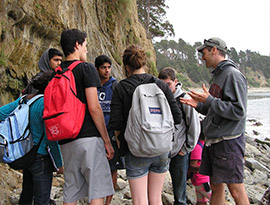Jonathan Payne, PhD
Professor of Geological Sciences and, by courtesy, Biology
 My interests in geology and the evolution of life started early, thanks to the plentiful fossils in the rocks around our house near Utica, New York, and a geologist friend of the family who took me out collecting in local quarries. I followed these childhood interests up more seriously as an undergraduate at Williams College, when I was able to take my first real classes in paleontology and geology. I really got hooked when I realized that research in this field would mean long stints in scenic places across the globe. After college, I spent two years teaching high school at a boarding school in Switzerland where I confirmed my love of teaching and mentoring, coached the school’s volleyball teams, and was able to travel far and wide in Europe on the weekends and during vacations. Inspired by teaching but wanting also to continue my own studies, I then returned to the United States to enter the Ph.D. program at Harvard, followed by a post-doctoral fellowship at Penn State. I joined the faculty at Stanford in 2005 and have built a lab group that studies the relationship between environmental change and animal evolution across geological timescales. We are particularly interested in the causes and consequences of mass extinction events and study these using information from the structure and chemistry of sedimentary rocks as well as the fossil record. We are increasingly seeking to apply insights from ancient extinction events to understanding and responding to the current biodiversity crisis. Outside of work, I enjoy traveling with my wife and two children, skiing in the mountains around Lake Tahoe, riding my bike, and watching sports of all kinds and at all levels.
My interests in geology and the evolution of life started early, thanks to the plentiful fossils in the rocks around our house near Utica, New York, and a geologist friend of the family who took me out collecting in local quarries. I followed these childhood interests up more seriously as an undergraduate at Williams College, when I was able to take my first real classes in paleontology and geology. I really got hooked when I realized that research in this field would mean long stints in scenic places across the globe. After college, I spent two years teaching high school at a boarding school in Switzerland where I confirmed my love of teaching and mentoring, coached the school’s volleyball teams, and was able to travel far and wide in Europe on the weekends and during vacations. Inspired by teaching but wanting also to continue my own studies, I then returned to the United States to enter the Ph.D. program at Harvard, followed by a post-doctoral fellowship at Penn State. I joined the faculty at Stanford in 2005 and have built a lab group that studies the relationship between environmental change and animal evolution across geological timescales. We are particularly interested in the causes and consequences of mass extinction events and study these using information from the structure and chemistry of sedimentary rocks as well as the fossil record. We are increasingly seeking to apply insights from ancient extinction events to understanding and responding to the current biodiversity crisis. Outside of work, I enjoy traveling with my wife and two children, skiing in the mountains around Lake Tahoe, riding my bike, and watching sports of all kinds and at all levels.
I feel extremely fortunate to work alongside so many talented and motivated people here at Stanford in all roles, including students, staff, and faculty. The most rewarding relationships, for me, are those with my graduate students because I am able to develop relationships that have lasted for many years and will last for decades. As much as possible, I try to provide students with my own input and advice when it is relevant and to identify other sources of training and advice when those will be more fruitful. In addition, I focus each year on maintaining a lab group that is mutually supportive, cooperative, and collaborative because I know that students and post-docs ultimately learn more from one another than from their faculty mentors simply because they spend so much more time with their lab-mates and cohort-mates than with their faculty committees.
As a mentor in the SoLID program, my objective is to help each student identify personal goals and then chart effective and realistic pathways toward those goals. I believe particularly strongly in the need to balance achievement at work with meaning and fulfillment in other areas of life and welcome the opportunity to help students find pathways to their own versions of balanced and rewarding lives and careers.
Students can email me directly (jonathan.payne1@stanford.edu) to set up a meeting time.